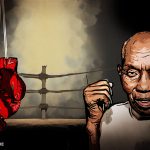Boxing’s shame in Saudi Arabia
The noble sport has a chequered past, littered with the dark forces that have bankrolled it before. But even with that past, staging a fight in Saudi Arabia with its human rights violations was a n…
Author:
20 December 2019

After everything, it was the bluetooth fist pump that tipped this tawdriness over the edge of decency.
It wasn’t Andy Ruiz Jr entering the building through a back door, his gut straining against the constraints of a snug green hoodie and his mouth flapping open and closed mechanically below his plasticine porcine eyes to chew his gum.
It wasn’t Anthony Joshua in his dressing room, gloved up, warmed up and loved up by his entourage whooping like bankers baying for bitcoin as the man himself faked a fuzzily focused expression of studied stupefaction while staring into the middle distance.
It wasn’t one of the boxers on the undercard having his cocaine-white boots wrapped in clear plastic to preserve their pristine condition until he reached the ring. It wasn’t Michael Hunter keeping it classy by dressing as Predator in homage to Arnold Schwarzenegger to take on Alexander Povetkin in the main supporting bout. It wasn’t even that totem to tanned, toothy too-muchness, Michael Buffer, adulterating the desert air with, “From the kingdom of Saudi Arabia … Let’s get ready to rumble!”
This is boxing. These things, and worse, happen. And a lot of what happened in Diriyah, Saudi Arabia, on 7 December looked like fight night anywhere: a maze of corridors strewn with endless functionaries in tattoos, T-shirts and snapback caps lugging truckloads of padded punching gear and energy drinks; floor-to-ceiling-to-wall hip-hop; and a frisson of danger, as if any moment now any or all of these overbearing malcontents could trip their sanity switch and start tearing at people’s throats.
Related article:
Out there in the 15 000-seater arena, which was built in less than two months by 175 workers under who knows what kind of duress, the familiar flimsy glamour was all around. The ring, protected by a curved canopy not unlike a parachute, was trapped in the amber of incandescence in the centre of the otherwise velvet darkness of the scene.
Boxing, but not like you know it
An empty boxing ring is a place so laden with promise and possibility that it is impossible not to be moved by the thought of what magic could be conjured there. In that roped, padded square, sealed from reality to make room for a bubble of unreality most of us will never have to countenance, greatness lives and dies. Diriyah’s ring was no different, and even the wind and rain that lashed it for hours before the fight couldn’t steal its thunder.
Seats were ranged high around three sides. The fourth was an exclusion zone, a platform raised above the hoi polloi and indeed the ring itself, reserved for Saudi crown prince Mohammed bin Salman and his cronies.
The uninitiated, of whom there were many in attendance, would never have guessed they were at a site called Al-Turaif. It has been an important part of the Arab world since it was founded in the 15th century, a place that was the country’s capital from 1744 to 1818, and included in Unesco’s World Heritage list in 2010. But 7 December wasn’t about that. It owed nothing to the past and little to the future. It was all about the now, and whatever didn’t fit into that narrative was disrespected and disregarded.
Money silencing conscience
Joshua’s promoter, Eddie Hearn, who manages to be slick and unctuous all in the same snugly dressed package, dismissed criticism of the decision to stage the fight in one of the world’s most oppressively authoritarian states with, “for me, it’s about delivering for my fighter and delivering for my client”.
Take that, Amnesty International and the slur of “sportwashing” they have slung at people like Hearn by saying: “Despite the hype over supposed reforms, the country was in the midst of a sweeping human rights crackdown.”
Hearn was having none of that in an interview with The Guardian newspaper in the days before the fight: “The Saudis want to show they are changing. And they want a more positive image worldwide by bringing in events. But isn’t that what they should be doing? They have got to change, and they are changing. But the great news is that boxing is going to be responsible for those changes, and that shows you the power of sport. The sportswashing thing is something over my head.”
And wait. There could be more… “The plan is to make Saudi Arabia the home of mega boxing. All due respect to Las Vegas, but this place has the ability to bring any fight they want here.”
Whatever else Hearn is guilty of – wilful ignorance, for instance – hypocrisy isn’t on his rap sheet. “I was driving up and down the road [in Riyadh, the Saudi capital] last night thinking of all the criticism I’ve been getting. And I passed Gucci, Starbucks, Dunkin’ Donuts, Versace and Ralph Lauren. And although it is easy for us to also say Formula E, the tennis Super Cup and the PGA Tour is here, too, I also believe that no one has the right to tell a fighter how and where they can earn their money.”
Far from absolving Hearn and his ilk from their share of the responsibility for lending a brutal pretence of normality – much like cricket does in Zimbabwe and most establishment sport did in apartheid South Africa – the promoter’s justification only highlights that they are part of the problem. So are the million and more pay-per-view subscribers who shelled out at least £24.95 (almost R400) to tune into the bout and out of what should matter.
But, hey, you heard the man: it’s all about the money. Joshua reportedly earned more than $60 million for fighting well within himself to claim a clear unanimous decision and thus avenge the shock seventh-round stoppage Ruiz earned when they met in New York’s Madison Square Garden in June. A few days before that huge payout, golfer Rory McIlroy turned down $2.5 million to play in Saudi Arabia.
The return of the champion
Watching the more clinical than usual Joshua use his fists like chisels to sculpt Ruiz’s ample flesh into ever more grotesque shapes during the Clash of the Dunes event, albeit only until it rebounded back into place, it was difficult to understand how the British fighter had fallen victim to the same palooka six months previously.
Then, Joshua’s reward for flooring Ruiz in the third was to be hammered to the canvas himself in the same round, the precursor to being downed twice in the seventh and apparently staring through a fog as the referee, Michael Griffin, called it off.
Ruiz, though resilient as hard-scrabble Mexican boxers often are, was limited both on attack and defence. How the hell could he have beaten properly – he was a point ahead on two scorecards when the fight was stopped – someone as obviously superior as Joshua?
Related article:
So there was a feeling that the natural order of things had been restored when Joshua reclaimed three versions of the world heavyweight title and one of the super heavyweight variety in Diriyah.
That was always likely, as was the chance of Joshua saying something as crass as “I understand what Andy brought to the table so I had to decapitate him in a different way” in a country where public beheadings are part of everyday life.
And if Joshua, as he kept saying, was “only here for boxing”, why did he indulge in the politics of observing the national anthems in the ring? But a line was crossed when Joshua and Salman exchanged fist pumps in the giddy aftermath; the boxer still in the ring, the tyrant ensconced in splendour on his platform.
Salman’s fist dripped with metaphorical blood – of the thousands slaughtered in the dirty proxy war Saudi has helped wage in Yemen since 2015, of the women who have been brutalised and are still jailed for daring to want to drive, of murdered journalist Jamal Khashoggi and the many others who have suffered monstrous fates for telling the truth.
Joshua’s fists had done the Saudi crown prince’s filthy work for him, under cover of sport. And here they were, celebrating like a couple of blokes in a bar cheering for their favoured football team. Next round’s on you, mate.
That was bad enough. But for Joshua to choose to share his moment of triumph with the embodiment of the evil of this empire so publicly was beyond the pale. Even the pail in every boxer’s corner, sloshed with spit, snot, blood and vomit, is clean by comparison. Shame on him.


